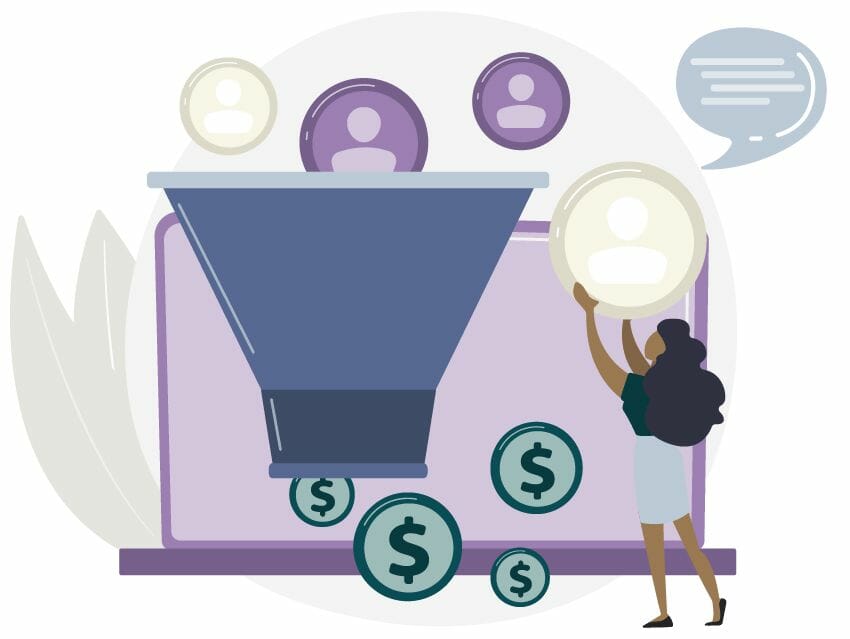
Now that you’re convinced CRMs are more than worth it for your business, you’ve probably consulted the almighty Google and encountered your worst nightmare: options.
Okay, okay- options are good to have (most of the time). However, when deciding what’s worth paying for and what’s not worth the risk, multiple options can get a bit overwhelming.
Yummy options at the Thanksgiving table? Good. Many restaurant options when deciding where to go for dinner with your partner? Bad (very bad).
Lucky for you, we are here to make one choice a little easier! Recently we took a look at Zoho CRM vs Hubspot’s CRM, and today we are diving into Zoho vs Salesforce Sales Cloud. Who will come out on top? Let’s see!

Salesforce and Zoho have both created CRMs that help your business continuously grow and run smoothly. With that said, their focus over the years has been a little different. Zoho has placed more of an emphasis (and more of their budget) on research and development, while Salesforce focuses more on marketing and promotion.
Zoho has found it important to develop a CRM fit for small/medium businesses all the way to enterprise level. Salesforce has focused more on the enterprise level and gradually worked their way to more mid-market ventures.
While both approaches are absolutely fine, choosing between the two will depend on the size of your business and your goals!
In terms of user-friendliness and how much experience you would need to operate the platform, Zoho CRM seems to be easier. Not that Salesforce is difficult to utilize, but Zoho truly caters to users of all experience levels. We noticed that Salesforce would probably be optimal if operated by a dedicated team.
Both CRMs include a high level of customization capabilities (and you know we like that!) Salesforce’s Lightning App Builder seems to be top notch, allowing users to create custom layouts and records. A similar feature in Zoho would be Canvas. One customizable feature that is exclusive to Zoho CRM would be custom buttons, which is seemingly unavailable in Salesforce.
It’s worthwhile to note that with Salesforce, many of the customization features seem to only be available for higher packages. Customization for Zoho is much more accessible to all user levels.
Lead gathering and nurturing is a huge component behind CRM usage, so both Zoho and Salesforce have solid process building and lead scoring features. In an all out feature battle between Zoho and Salesforce, Zoho seems to have a more comprehensive set of lead tools in their toolbox. Salesforce’s lead tools seem to be more basic, but there’s certainly nothing wrong with perfecting the basics! Again, choosing between the two will largely depend on what you and your business are looking for.
One cool feature to mention? Sales representatives can scan a business card and Zoho CRM will easily convert the information into a contact! Zoho CRM can also create leads from social media platforms, which you cannot do with Salesforce unless you pay for the Social Studio plugin.
Although a little weaker with the social media integrations, Salesforce can generate solid leads by integrating with Outlook and Gmail, which is definitely a convenient tool.

It’s no mystery that Zoho has some excellent integration capabilities (we talk about it constantly)! Unfortunately, this is where Salesforce really fell short for us.
With Zoho CRM, you can seamlessly integrate with over 40 other Zoho products like Zoho Books, Zoho Desk, and Zoho Sign; Salesforce doesn’t have that perk.
One thing that really suffers from this lack of integration power? Team collaboration. Zoho CRM has Workplace, a convenient way to effectively communicate with coworkers and employees. Through apps like Cliq, Meeting, and Workdrive, you can share documents and updates with the click of a button. With Zoho CRM you can also incorporate third party applications like Microsoft Teams and Slack for ultimate team collaboration!
While Zoho users can integrate with third-party applications no matter the CRM edition, Salesforce only allows this in the top packages. You can’t utilize popular applications like ZenDesk, MailChimp or Quickbooks until you pay for the Professional or higher Salesforce Sales Cloud packages.
Ah, the inevitable price discussion. In a side by side comparison, Zoho is indeed cheaper than Salesforce Sales Cloud. Zoho also offers a free version of their CRM (with limited users), whereas Salesforce only has the free trial. Both offer a 30 day free trial.
Both pricing models are centered around standard (essentials), professional, enterprise, and ultimate packages. Each CRM bills you per user, offering monthly or annual subscriptions. So, again, depending on the size of your company and your ultimate goals, either could be the better fit- you’ll just have to decide which one is worth the investment!

So, as an epic entrepreneur, what is your CRM focus? Leads? Integrations? Customization? Don’t worry, we’ll quit asking you questions (eventually)!
Whether you are just starting out or you’re a well-established business, there’s a CRM out there for you. It’s all about finding the one that suits your needs the best! Even though it requires a little bit of research, we are confident one will be a perfect fit.
Let us know if you end up choosing Zoho CRM or Salesforce Sales Cloud- we’d love to hear your opinions on the topic!